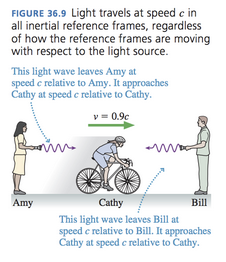
Speed of light is a fundamental constant in the universe. Speed of light in vacuum (c) is same in all inertial reference frames. This is a fundamental postulate of special theory of relativity.
Here's an illustration to explain this concept. Irrespective of the speed of the source of light or the observer, the speed of light is always the same. This is very different compared to other objects in the universe.
For example, if you are in a car moving at 100 km/hr and you throw a ball at 10 km/hr, the speed of the ball as observed by someone outside the car would be 110 km/hr. But this is not the case with light. The speed of light is always the same.

Why this is the case is a "mystery". But this has been confirmed by numerous experiments most famously by Michelson-Morley experiment.
You can consider it as a speed of casuality. Anything which affects anything else in the universe is limited by the speed of light.
What would be interesting to ponder is : How would physics be different if those rules were slightly different? e.g If c was a slightly smaller number? What if c was millions of light years per second?
So much of what we experience in this universe depends on values of these fundamental constants. What the world would have looked like if they were different?